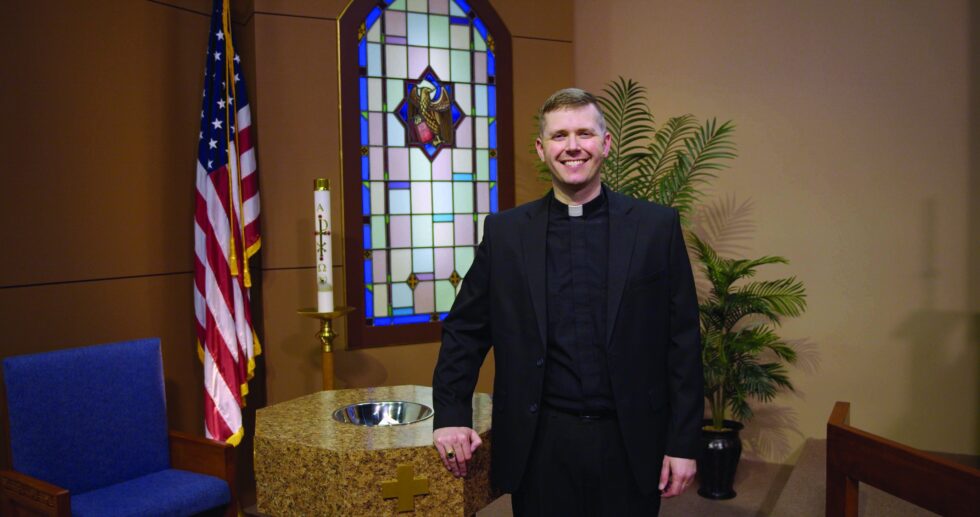
By CH(CPT) Theodore Hoham, USAR
Life in the military can be a lonely and challenging experience. When I began my military journey at the age of 19, I remember the adjustment from civilian life to the military being difficult as I learned to wake up early, take orders, and incorporate a higher level of discipline into my life than I ever had before. In addition, I remember the added stress of being away from home and missing my family, trying to adjust to a lifestyle that was foreign while living 24/7 with a platoon full of people I had never met.
While I have now been in the Army for well over a decade and made many close friends during my time in service, life in the military continues to involve long periods away from home and times of isolation and adversity as Soldiers train and deploy in service to their country. The accompanying issues involving work and family take their toll on Soldiers, and that is where my role of the chaplain enters in: To be a listening ear, a counselor, and a shepherd as we bring God to Soldiers and Soldiers to God.
In the U.S. Army Chaplain Corps, we provide comprehensive pastoral care to our servicemen and women by nurturing the living, caring for the wounded, and honoring the fallen. Military chaplains walk alongside our Soldiers, Sailors, Airmen, and Marines from the day they arrive at basic training and remain at their side throughout their time in service, deploying alongside them unarmed into harm’s way in order to bring the presence and peace of God into situations that are dangerous, frightening, and trying on their mind, body, and spirit.
This “ministry of presence” places the chaplain into the foxholes and onto the decks of naval vessels at sea as we bring the Word of God to those in desperate need of it.
As a LCMS chaplain, I have the additional privilege of providing Word and Sacrament ministry to our LCMS Lutherans who serve in the armed forces by preaching, baptizing, confirming, and administering the Lord’s Supper, whether it be in a post chapel or from the hood of a humvee.
During my years as an Army chaplain, I have been able to preach and teach God’s Word to active-duty Soldiers, reservists, and National Guardsmen all over the United States as well as deployed overseas.
Most recently, I served as the chaplain for a large military medical facility in the Middle East, where I was responsible for providing religious support and pastoral care for hospital patients, medical providers, and anyone else within our area of operations.
During that time, our hospital cared for patients suffering everything from minor illnesses to serious physical trauma, and I was gifted with seemingly endless opportunities to nurture the living, care for the wounded, and honor the fallen.
Whether in the chapel, in my office, or at the bedside of a sick or injured Soldier, there was always someone to counsel, pray with, and share the love of Christ as described and given to us in the Scriptures.
Martin Luther described the life of a pastor as consisting of three elements: oratio (prayer), meditatio (meditation), and tentatio (affliction). Christians who serve in uniform also experience all three of these throughout their time in service, and chaplains are there to assist them in their prayers, guide them in their meditation on God’s Word, and to comfort them in times of affliction.
The practice of oratio (prayer) is a constant for a pastor, as it also should be for a Christian serving in the military. Saint Paul reminds us in 1 Thessalonians 5:16-18 (ESV) to “rejoice always, pray without ceasing, give thanks in all circumstances; for this is the will of God in Christ Jesus for you.”
During my time overseas, I soon discovered that there was always someone to pray with and for, as there was always someone experiencing the joys, trials, and even boredom that always accompany a military deployment. Life back home doesn’t stop during a deployment, and there was rarely a time when at least one of my Soldiers wasn’t experiencing a rough time in a relationship, financial worries, and a host of other concerns on top of a steady amount of homesickness and uncertainty. For this reason, when a Soldier came to talk to me I would always ask to pray with them regardless of whether or not they were a practicing Christian, and I never had any refusals.
Prayer is a precious and powerful gift from God, and through it he gives to us “the peace that surpasses all understanding” (Philippians 4:7 ESV) that brings comfort into tense and painful situations. Praying with Soldiers allows them to place their burdens onto the shoulders of Jesus, making their own load easier and reminding them that, even though they are thousands of miles away from home and in a strange land, their Heavenly Father is still mindful of them and cares for them.
The practice of meditatio (meditation), centered on the Word of God, gives voice and direction to our prayers and is also a crucial function that chaplains provide as we minister to those under our care. God commands us in Joshua 1:8 (ESV) to “meditate on it day and night, so that you may be careful to do according to all that is written in it.”
As a chaplain on deployment, this often takes the form of Sunday services, preaching, Bible study, confirmation classes, as well as courses on marriage and spiritual health. Many of the Soldiers I ministered to considered themselves Christian but lacked a foundation in Scripture as well as a church home back in the States, and several of them expressed interest in joining the Lutheran church after attending Sunday worship and Bible Study for a short time. This provided an amazing opportunity not only to reintroduce them to the lifesaving Gospel, but also to put Luther’s Small Catechism into their hands and expose them to the historic and faith-affirming hymns and liturgy of the church. It was always a joyous occasion when prayer, worship, and instruction brought a Soldier to the waters of Holy Baptism or to the altar to receive the body and blood of Jesus Christ, and to hear a new Christian confess his or her faith in words of the ancient creeds of the church.
Finally, as would be expected, overseas deployments offer plenty of tentatio (affliction). This affliction ranges from the personal, spiritual, and mental struggles already mentioned, as well as the injuries and death that sometimes result from military service, which is difficult and dangerous by nature. This holds especially true in a military hospital, where our daily work consists of caring for the sick and injured.
For both patients and Army medical providers, the hospital can be a place of immense trial and suffering and the chaplain’s role is to always bring the presence and comfort of God to everyone involved, whether it be in the emergency room, recovery, or the break room.
While it was my pleasure to share many times in the joy that accompanies patient recovery, there were also times when treatment proved ineffective or when the patient arrived too injured for us to help. In these moments, any words of my own that I could provide would have been useless at best and harmful at worst. The only thing that would suffice is the comforting message of the Gospel with its promise of salvation, bodily resurrection, and eternal life in Jesus Christ. For those working to care for the patient, both before and after death, as well as the patient’s family, the presence and prayer of the chaplain is a comforting assurance of God’s care and compassion in the midst of suffering, as well as a reminder of the Army’s commitment never to leave a fallen comrade.
While military chaplains work hard to minister to those whom God has entrusted to our care, we are unable to do so without the Lord’s help and the fervent prayers of those back home.
Whether it’s during Sunday Divine Service or your own personal time of prayer, I encourage you to please take a moment to pray for our chaplains and for those whom we shepherd. Please pray for the safety of our servicemen and women, that they would come to and be strengthened in faith in Jesus Christ, and that their chaplains care for them with compassion, dedication, and steadfast love.
Finally, if you are interested in seeking out other ways to support our LCMS chaplains and servicemembers, I encourage you to reach out to the LCMS Ministry to the Armed Forces and the Military Project at Concordia Theological Seminary-Fort Wayne.
May our Lord Jesus Christ continue to bless and protect our citizens in uniform, keep them in his safe keeping, and bring them home to joyful reunions with their loved ones.
CH(CPT) Theodore Hoham, USAR, serves in the U.S. Army Chaplain Corps and as a host on Worship Anew for the Armed Forces Network. At home, Pastor Hoham serves as a theology teacher in Fort Wayne, Ind.
Through the Armed Forces Network, Worship Anew reaches thousands of deployed servicemen and women. We are thankful for their service, and are proud to walk alongside those providing spiritual support for our Soldiers locally and abroad. Thank you for our Freedom!


